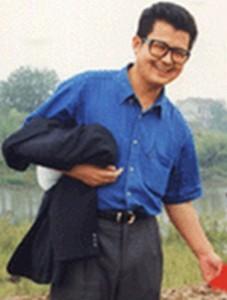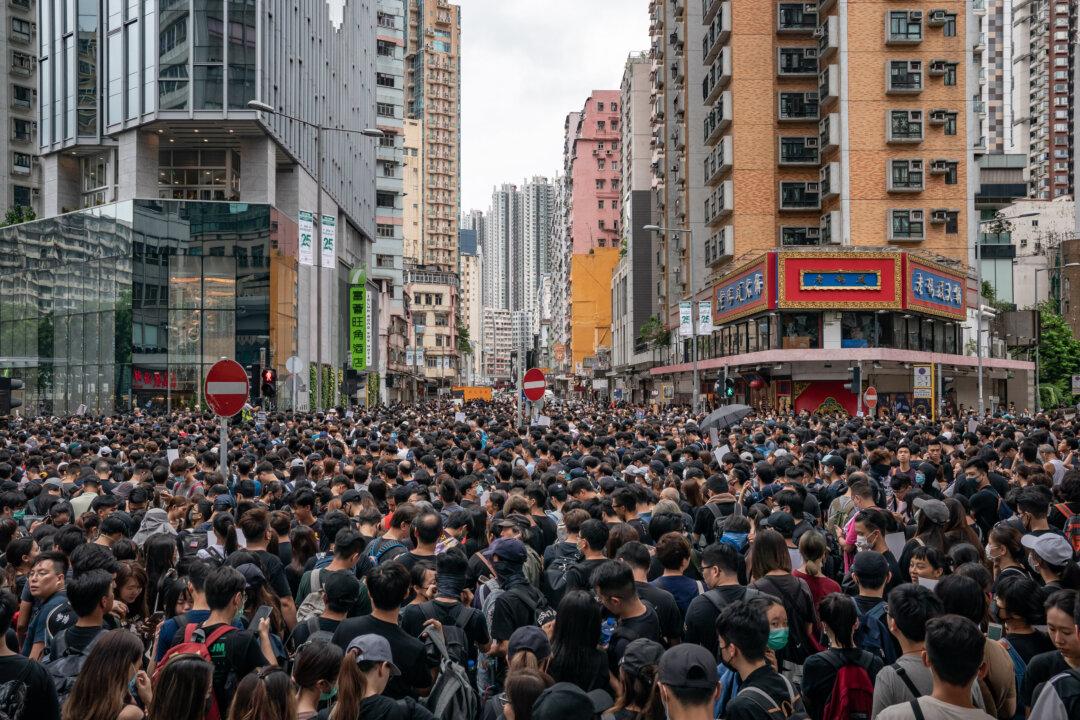HONG KONG - Authorities in the southern Chinese province of Guangdong have formally arrested a human rights lawyer who had been helping local villagers in a hard-fought land dispute with local government, lawyers said.
Guo Feixiong “disappeared” following violent clashes between residents of Taishi Village in Guangzhou’s Panyu District in mid-September. He has been held under administrative detention in the district after helping villagers mount a legal campaign to have their elected village chief removed from office, lawyers said.
“This afternoon at 6:07 p.m., I received notification from officer Hu at the Panyu police station that Guo’s arrest had been approved and now had taken formal effect,” lawyer Guo Yan told RFA’s Cantonese service.
“The document requested that I get in touch with his legal representative. I have already alerted Gao Zhisheng in Beijing that our bail application made on Sept. 26 has not been approved,” she said.
Gao is head of the Beijing-based Zhisheng law firm and Guo’s employer.
Hunger Strike
This afternoon at 6:07 p.m., I received notification from officer Hu at the Panyu police station that Guo’s arrest had been approved and now had taken formal effect. The document requested that I get in touch with his legal representative.
“This afternoon at 6:07 p.m., I received notification from officer Hu at the Panyu police station that Guo’s arrest had been approved and now had taken formal effect. The document requested that I get in touch with his legal representative.”
According to local sources, Guo is continuing his hunger strike at the Shawan Detention Center in Panyu. He refused all food and water from the first day of his detention, and has already been given emergency medical treatment and force-feeding by detention center staff.
In an interview with RFA’s Mandarin service, Guo’s sister Yang Maoping said one lawyer had managed to see Guo since the announcement. “He made an assessment of his health, saying that he was already experience some irregularities in his breathing,” she told reporter Yan Ming.
Villagers expressed shock at the news. “I don’t know why they treated him this way. All he did was speak up on behalf of some ordinary people,” said the wife of villager He Jingchao who has been detained since last month’s crackdown.
Meanwhile, Guangzhou-based literature professor Ai Xiaoming, who wrote an outraged open letter to Premier Wen last month protesting the rough treatment of elderly protesters by the authorities during the clashes, was uncharacteristically silent.
“I think that there is actually very little space for free debate on this subject, and now there’s really very little left to talk about,” Ai told RFA.
I think that there is actually very little space for free debate on this subject, and now there’s really very little left to talk about. If there are no guarantees for personal safety, then there’s nothing to say.
“I think that there is actually very little space for free debate on this subject, and now there’s really very little left to talk about. If there are no guarantees for personal safety, then there’s nothing to say.”
“If there are no guarantees for personal safety, then there’s nothing to say,” she added, in an apparent hint that she had received threats herself.
The Taishi standoff, widely seen by Chinese scholars and the legal profession as a test of local governments’ commitment to village democracy and rule of law, began in July after a 100 million yuan (U.S. $12 million) land deal involving more than 2,000 mu (133 hectares) of village land.
Villagers and their lawyers said accounting procedures around the sale were not transparent, and they suspected Chen of embezzling public funds.
In clashes earlier this month, riot police ended a hunger strike and fired water cannon on protesters, many of them elderly, prompting widespread outrage among ordinary Chinese with access to news reports of the incident.
Alleged ‘White Terror’
Last month, villagers fought against government attempts to stack the re-election committee in its favor, electing seven of their own candidates ahead of a key vote slated for Oct. 7 on whether village chief Chen Jinling should remain in office.
However, attempts by officials to scupper the campaign appear to have succeeded, with Friday’s vote reportedly cancelled and with all seven of the victorious candidates now having tendered their resignation.
The truth is that a victory in Taishi would have thrown into question the legality of a whole slew of similar property deals right across the Pearl River Delta region. Because an awful lot of property there is built on illegally acquired land in which the original land-rights holders—the farmers—had not consented to these transactions. The fierce reaction by the Guangdong authorities to the Taishi campaign shows just how clearly they realize that the Taishi issue is not an isolated phenomenon.
“The truth is that a victory in Taishi would have thrown into question the legality of a whole slew of similar property deals right across the Pearl River Delta region. Because an awful lot of property there is built on illegally acquired land in which the original land-rights holders—the farmers—had not consented to these transactions. The fierce reaction by the Guangdong authorities to the Taishi campaign shows just how clearly they realize that the Taishi issue is not an isolated phenomenon.”
Villagers reported a “white terror” campaign by township and district officials, who used personal and family ties, threats, banquets and a door-to-door signature campaign to derail support for Chen’s recall.
They said many villagers were persuaded to abandon their campaign in return for the release of detained fellow protesters, many of whom were in their seventies and eighties.
Rights activists Zhao Xin and Liu Di—also known by her online nickname of “Stainless Steel Mouse”—have been raising funds to help the villagers continue their legal campaign.
Zhao said the Taishi Village dispute illustrated the waning authority of central government, because what were essentially good policies on their part were not being implemented on the ground.
“The biggest obstacle to China’s grassroots democracy is that the local powers-that-be will not accept checks and balances from anyone...China’s central government has a lot of good policies, like wanting move towards the rule of law. But when you get down to county, township, village level, they are simply not being implemented.”
Grassroots Democracy?
“So it becomes very hard to get any further with it...Central government’s power is on the wane, and it’s giving way to local chieftains who have unlimited powers.”
“If they continue to be allowed to use mafia-type tactics, any methods they like, to oppose a legal struggle on the part of villagers and workers, then at the end of the day, the biggest losers will be the Communist Party central government,” Zhao said.
The administration of Premier Wen Jiabao and President Hu Jintao has been pushing its brand of grassroots democracy in speeches overseas, with Wen saying that if rural communities can be trusted to run their own villages, then they should also be trusted to run townships.
But scholars and activists say that events of Taishi will show that the opposite is true for ordinary Chinese citizens.
“The truth is that a victory in Taishi would have thrown into question the legality of a whole slew of similar property deals right across the Pearl River Delta region,” U.S.-based commentator Liang Jing said on a recent broadcast on RFA’s Cantonese service.
“Because an awful lot of property there is built on illegally acquired land in which the original land-rights holders—the farmers—had not consented to these transactions. The fierce reaction by the Guangdong authorities to the Taishi campaign shows just how clearly they realize that the Taishi issue is not an isolated phenomenon.”
Liang said the authorities had to react with all their power to “avoid precipitating a wave of similar challenges to already established land deals in the event of a victory for the Taishi campaign, which would be an unthinkable scenario.”
“But there is widespread concern that China will not manage to get through this next phase of progress without social upheavals and bloodshed. It is for this reason that the Taishi Village incident should not be taken lightly,” he wrote.
For more information, please see: Western Journalist Brutally Beaten in Taishi Village , Taishi Village’s Struggle for Democracy in China (Photo Essay, Part I) , Chinese Legal Community Provides Assistance to Missing Attorney , and Chinese Villagers’ Lawful Election Meets Crackdown
Original reporting in Cantonese by Mei Kin-kwan and Liang Jing, and in Mandarin by Yan Ming. RFA Cantonese service director: Shiny Li. RFA Mandarin service director: Jennifer Chou. Translated and written for the Web in English by Luisetta Mudie and the Mandarin Web team. Edited by Sarah Jackson-Han.


